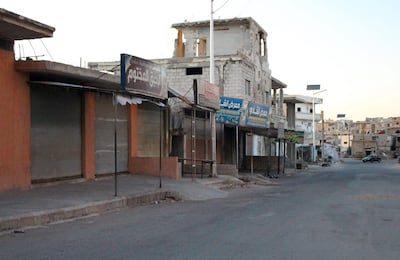Syrian regime forces pounded the southern rebel enclave of Deraa Al Balad with hundreds of rockets on Sunday after a Russia-mediated surrender deal fell through.
Opposition sources in Amman and witnesses said at least 400 rockets hit the besieged area over 12 hours while the enclave's defenders fought street battles with the Syrian army and Iran-backed militias.
“We have not seen bombing like this in the last 10 years,” said Samer, a resident of Deraa Al Balad.
“They are using multiple rocket launchers and anti-aircraft guns against the neighbourhood.”
He said at least one person had been killed and dozens wounded, including a teenage girl who lost an arm after being hit by shrapnel.
Several hundred rebels are in Deraa Al Balad, along with a similar number of civilians, out of an original population of 40,000, opposition sources in Amman say.

The district, part of the city of Deraa, which is on the border with Jordan, has become the centre of international currents affecting the Syrian conflict.
Its residents are rural Sunnis, who formed the backbone of the 2011 revolt against President Bashar Al Assad. His father, Hafez Al Assad, took power in a 1963 coup along with a group of officers from Syria's Alawite minority.
The resistance in the enclave has hindered Jordan's efforts to rebuild ties with the Assad regime after its crackdown on the initially peaceful revolt. Unlike many countries in the region, Jordan has kept its embassy in Damascus open.
Regime attacks on Deraa Al Balad and other rebel areas in southern Syria killed at least 50 people in the past six weeks, activists in the area say.
The kingdom closed its border crossing with Syria last month, citing the violence, days after it lifted trading and movement restrictions with regime areas.
Jordan has not responded to a public appeal by civil leaders in Deraa Al Balad on Saturday for “safe passage” for civilians and fighters to flee the district.
Residents of Deraa Al Balad, and southern Syria as a whole, have close family links with clans just across the border in Jordan.
The appeal was issued in a videotaped message from five civil figures in the name of the “clans of Deraa Al Balad”. They asked Jordan’s King Abdullah II to use his international connections to let people flee to Jordan, if he could not stop the “annihilation and depopulation campaign” against the district.
One of the five, Faisal Aba Zeid, belongs to a prominent clan in southern Syria, while another, Adnan Al Masalmeh, has led negotiations with the Russian military on behalf of Deraa Al Balad.
Most of Deraa Al Balad’s population, about 38,000 people, have fled to areas near Russian positions in and around Deraa.
Russia, an Assad ally, entered southern Syria in 2018, following a deal between Moscow, Washington and Israel for the regime to return to southern Syria.
The latest attack on Deraa Al Balad came after a Russian-supervised surrender agreement collapsed for the second time in two weeks. The deal would have allowed some rebels to stay in the district without weapons. The rest would be deported to areas under the Turkish sphere of influence in northern Syria.
Differences persisted over the size of the regime's military presence and whether the district as a whole would have to disarm.
A member of the Syrian opposition in Amman said Russia wants to restore full regime control over Deraa Al Balad, whereas the 2018 deal allows for a measure of self-governance in opposition areas.
“The international picture three years ago was different,” he said. “Russia now has a free hand in southern Syria.”
The attacks on Deraa Al Balad are being led by the Fourth Division, a praetorian guard headed by Maher Al Assad, the president's only surviving brother and the second most powerful man in the regime.
Iraqi and Lebanese militiamen are also surrounding Deraa Al Balad, directed by Hezbollah commanders in the Syrian town of Izraa, 40 kilometres north of Deraa, defectors from the Syrian military in Amman say.
Although Russia has sought to portray itself as a peacemaker in southern Syria, the offensive on Deraa Al Balad could not have taken place without approval from Russia, they said.
Moscow is regarded as wanting to avoid the forced population transfers seen in other former rebel areas that came under Moscow’s influence since it intervened in Syria in 2015.
Russia’s intention, western diplomats in Amman say, is to encourage international funding for Syrian reconstruction by showing that the era of bloodshed in regime areas is over.
A European diplomat in Amman said a perception that the US position in the Middle East has weakened had encouraged the Russians to renege on the 2018 deal in southern Syria.
“The US withdrawal from Afghanistan has further weakened Washington,” the diplomat said.
“Beyond verbal condemnation, the US has been acquiescing to everything the Russians are doing in southern Syria.”







